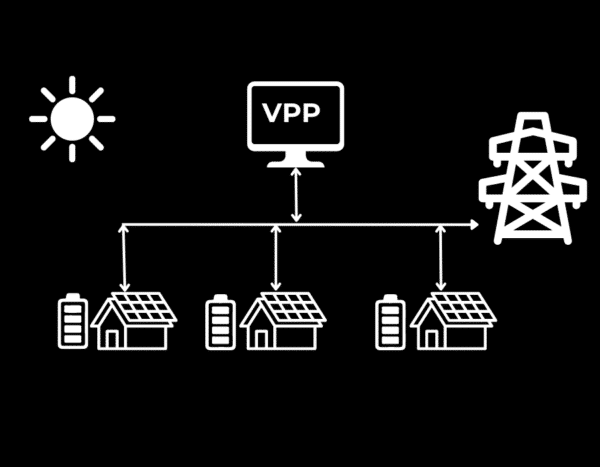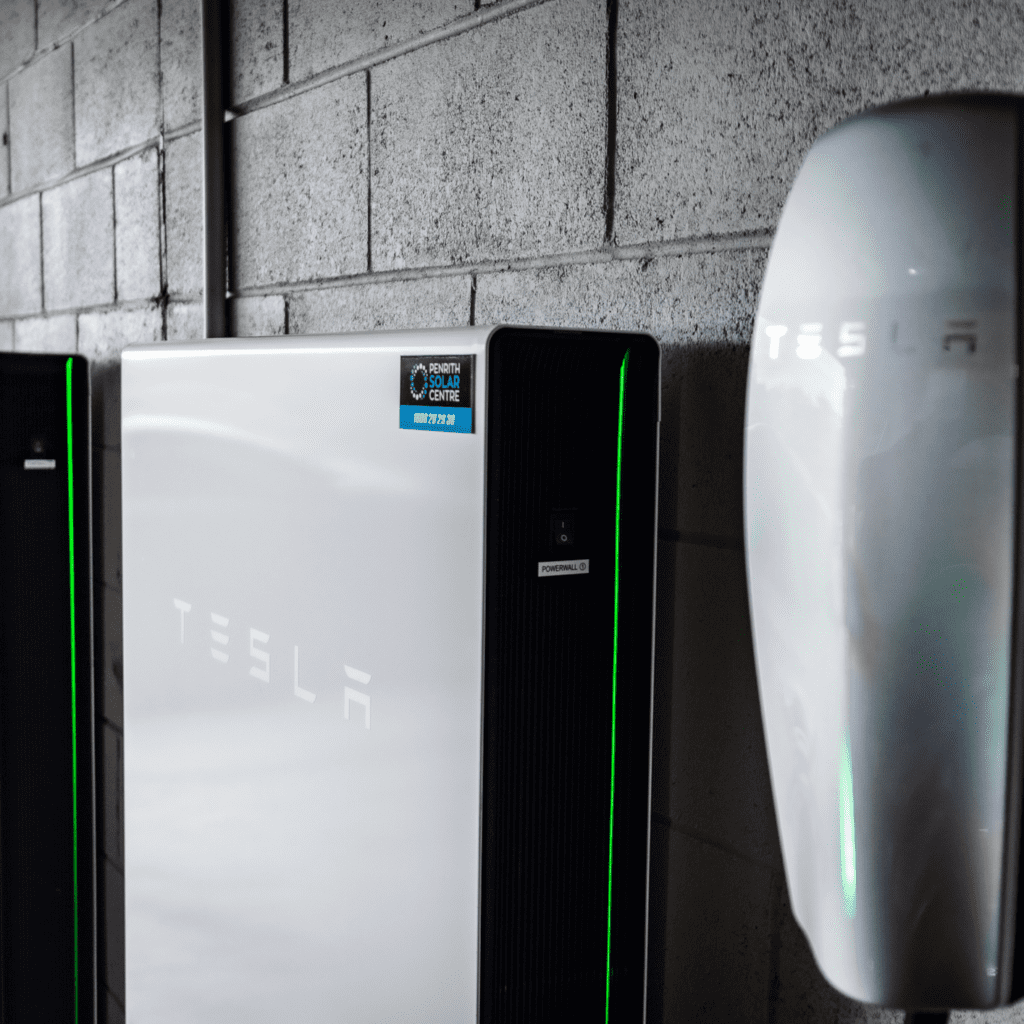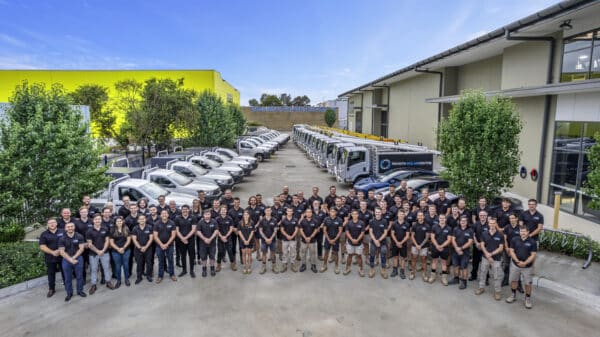
Energy prices are on the rise.
As professionals managing commercial properties, you’ve likely noticed your energy bills creeping higher and higher. How big was your last energy bill?
Reducing energy costs isn’t just about saving money—it’s about making smart, sustainable choices that benefit your bottom line and community. That’s why battery storage is becoming a game-changer for businesses. Solar batteries are a wonderful complement to solar installations on warehouses and office buildings across New South Wales.
At Penrith Solar Centre, we specialise in turning energy problems into energy solutions. We believe in the power of commercial battery storage to transform your business.
In this article, you will learn:
- Why Consider Battery Storage for Your Business?
- Comparing Types of Commercial Battery Storage
- Understanding Virtual Power Plants (VPPs)
- The Future of Battery Storage: Emerging Trends
Whether you own or lease your building, adding battery storage to your solar setup can slash your energy bills or even eliminate them. Let’s dive into it.
Why Consider Battery Storage for Your Business?
Battery storage offers numerous benefits for businesses. Historically, the commercial solar industry largely ignores battery storage. The reason for this is that most businesses operate while the sun’s up.
There are a lot of advantages to installing batteries when you install solar panels on your roof. It goes well beyond nighttime energy needs.
It’s important to note that you do not need solar on the roof to take advantage of these possibilities. Batteries can charge and discharge from the grid and accomplish the energy goals we’re diving into (it’ll just cost more than if you installed batteries with solar panels because you’re importing energy from and exporting it to the grid).
Here are some reasons why you should consider battery storage:
Financial Savings:
As the price of batteries drop, the equation for using them is becoming quite attractive.
Peak Shaving: Reduce your electricity bills by using stored energy during peak hours when electricity rates are highest. This can lead to significant savings.
Demand Charges: Many commercial electricity rates include demand charges based on the highest amount of power used at any one time. By using stored energy to lower peak usage, businesses can reduce these charges.
Passive Income:
Programs like Virtual Power Plants (VPPs) where you can earn money by providing energy to the grid are turning your battery storage system into a revenue-generating asset.
Buy electricity when it’s cheap (or harvest it from your solar panels) and store it for use when prices go up. Or export your stored energy when your energy retailer is buying electricity and offering you the best rates.
Backup Power:
Make sure you keep essential systems and equipment running during outages. This is necessary for businesses that rely on a constant power supply, such as hospitals, data centres, and manufacturing plants.
It’s not just about keeping the light on. Backup power can keep security systems and medical equipment running without noticing so much as a flicker when the grid goes down.
Examples: A vet clinic in Penrith uses battery storage to keep critical operations, like the medicine fridge and operating table, powered during outages. They can’t have power going out during surgeries. All dogs go to heaven, but that shouldn’t happen because of a blackout.
Energy Independence:
By generating and storing your energy, you reduce your dependence on the grid. This is especially beneficial in areas with unreliable power supplies.
With a reliable source of stored energy, you are less vulnerable to external energy market fluctuations; your business will be more resilient to price hikes and supply disruptions.
All of the above is possible when you invest in battery storage. When you combine it with monitoring your energy use and storage, you’ll be far more successful. Adjusting your usage based on that will potentially save your business a lot of money.
If you’re interested in reading up about how to do that in a commercial context, you might want to check out the following article titled, Commercial Solar Energy Usage and Monitoring.
Understanding Virtual Power Plants (VPPs)
VPPs are networks of solar systems with batteries that are like a real-life power plant if it were decentralised. A VPP network will command all the connected solar batteries in its network to charge and discharge in unison to relive stress on the grid.
Virtual Power Plants play a crucial role in stabilising the grid. The more batteries we have, the better and more reliable the existing infrastructure will become.

The financial incentives mentioned earlier in this article can generate passive income for your business when you install battery storage. It’s equally important to monitor your energy use and program your system to charge or discharge according to time of use rates. VPPs have some really attractive time of use tariffs.
As more companies bring VPPs to the market, the most successful ones will be those that share the highest profits with consumers. If companies try to keep all the profits, customers will likely move to other providers.
If you’re interested in learning a bit more about VPPs, you might want to check out the following article titled, Variable Feed-in Rates and VPPs in NSW.
Comparing Types of Commercial Battery Storage
Battery storage systems come in various sizes and capacities, tailored to different needs and applications. Understanding the types of battery storage available can help you choose the best option for your business.

Small to Medium-Sized Batteries
Small to medium-sized batteries are perfect for most commercial properties. Lithium-ion batteries are the most common due to their high efficiency and long lifespan. Here’s why they might be a good fit for your business:
Flexibility: These batteries are versatile and can be used in a variety of settings. They are suitable for small to medium-sized businesses that need reliable backup power and want to reduce energy costs.
Scalability: You can start with a smaller battery storage setup and expand as your energy needs grow. Batteries can also be “stacked” to increase storage capacity – which means you can add batteries together to double, triple, or quadruple your storage.
Ease of Installation: These batteries are relatively easy to install and can be wall-mounted or placed in dedicated areas without taking up too much room.
Tesla Powerwall 2
This is a popular and reliable option. The Tesla Powerwall offers 13.5kWh of storage capacity per unit.
Scalability: Up to 10 Powerwalls can be connected together for a total of 135kWh of storage.
Features: The Powerwall seamlessly integrates with almost any solar system, and it has a sleek design that we feel is easy on the eyes.
Large-Scale Batteries
Here’s why large batteries might be suitable for your business:
High Capacity: These batteries offer much larger storage capacities, making them ideal for businesses with high energy demands. With their storage capacity, large-scale batteries keep essential operations running, even during extended power outages.
Grid Services: Large-scale batteries can provide energy to the grid to help stabilize it. As mentioned before, energy retailers and distributors love this and will pay well at different times of day for your energy.
Tesla Megapack
The Tesla Megapack is a utility-scale battery solution with a storage capacity of up to 3.9MWh per unit.
Footprint: Each Megapack is about the size of a shipping container, making it suitable for large installations. It’ll take up a couple of parking spaces.
A single Megapack can power a small neighbourhood for several hours.

Hornsdale Power Reserve: The Hornsdale Power Reserve in South Australia is a prime example of large-scale battery use.It can quickly supply power when there is a sudden demand.
This battery installation paid for itself in just two years by providing reliable backup power and participating in the energy market. It’s a great demonstration of how effective large-scale batteries can be.
If you’re interested in learning a bit more about the Tesla Powerwall 2, you might want to check out the following article titled, What is the Lifespan of the Tesla Powerwall 2?
The Future of Battery Storage: Emerging Trends
Battery technology is continually evolving, and the future looks promising. Advances in battery chemistry are leading to safer, longer-lasting batteries.
Lithium iron phosphate (LiFePO4) batteries offer improved safety and better performance over time compared to older technologies. It’s much safer than its competition or predecessors. The warranties are better too because of how slowly it degrades (with proper use).
It’s becoming obvious that we’re moving into a world of energy management.
Investing in battery storage will transform your business. The advantages are significant and far-reaching. As battery technology continues to advance, these benefits will only grow, making battery storage a valuable asset for businesses.
If you’re interested in learning a bit more about why the future is electric, you might want to check out the following article titled, Commercial Solar Energy in Sydney: Why Should I Consider It?
Final Thoughts from Jake Warner, Managing Director of Penrith Solar Centre

Commercial batteries (really, battery storage in general) is such an opportunity in front of us. With VPPs, there are opportunities to make money and pay batteries off very, very quickly.
Traditionally, battery storage is pitched towards homeowners because the sun is up when businesses are open. It makes sense in the commercial business space to bolt on a lot of batteries, and here’s why:
All commercial premises have a huge electrical connection to the grid. So, when the grid needs energy, you’re able to assist by deploying a massive amount of energy all at once. This is very different from a residential connection, which has export limits that need to be adhered to. By utilising that larger connection to the grid, you’re able to support the grid when it needs it most. The bigger the support, the bigger the pay check.
The Future of Energy with Battery Storage Is Looming Charge
Now you have a solid understanding of how commercial battery storage can complement your business. The benefits are clear: significant cost savings, reliable backup power, and increased energy independence. The impact on your energy bills will depend on your unique energy usage and goals, and how your business operates day-to-day.
At Penrith Solar Centre, every partnership begins with a conversation. We take the time to learn about your business and how it uses energy. Selecting the right battery storage solution is a decision that can boost your bottom line for years to come. Our goal is to help you navigate energy management and find the best solutions tailored to your business.

If you’re interested in learning a bit more about how safe the different types of solar systems are, especially how volatile high voltage DC solar systems are, might want to check out the following article titled, How Important is Rapid Shutdown in a High Voltage DC Solar System?










